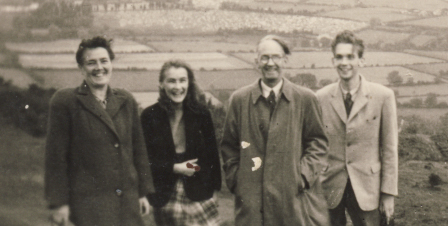

Hugh Shields’s mother Norah and father John both sang and knew children’s street-rhymes and songs, and he was to develop a lifelong interest in these, as well as ‘adult’ folk songs.
Hugh’s first job after graduating was as a teacher of French and German in Coleraine, Co Derry in the academic year 1953—54. It was during that time he met the Magilligan singer Eddie Butcher and began to be immersed in the rich local song tradition. This relationship was to yield one of the most highly regarded collections of recorded and published Ulster songs in existence. The Magilligan collection Shamrock, Rose and Thistle is freely available online at ITMA, and via the ITMA shop we present the published book and CD recordings All the Days of His Life: Eddie Butcher in his Own Words.
Interestingly, the first song Hugh wrote down in manuscript at the time was the fragment Johnny Jow— one of our Dusty Bluebells items. It was sung to him by a Belfast woman staying in the same lodgings in Castlerock, Co Derry in 1953. He continued noting down song texts and tunes in manuscript until 1961, when he bought a heavy Philips 4-track mains tape recorder. In Hugh’s article “Collecting songs ‘by hand’ 1954—1966.” he describes in detail the processes involved. (Irish Folk Music Studies, vols. 5—6, 1986-2001 pp. 61—76.) From mid 1966 until 1983 he used the more portable Uher model, on loan from the Ulster Folk Museum. Subsequently he used a Sony Professional cassette recorder. Although most of his recordings were of adult songs Hugh was always on the look-out for children’s songs and rhymes, and for songs which he thought might appeal to children. During a productive but very hectic recording visit to Co Derry Hugh wrote:
“I rounded up 7—8 lovely looking children who were playing in the quite vast yards of the farm. We recorded some desultory skipping, the recording marred by a strong wind. Then we went into a large reverberant shed and recorded a ‘play’ which was really amusing: largely invented, but having traditional structure ‘Bang bang the dishes’. It was unfortunate that the two stars took a fit of giggles in the middle of it, for I had hopes of getting a really good recording. Anyway the children were very willing and did good things”.
— Hugh Shields, writing to his wife Lisa, 16—20 July, 1969
Of the some 230 reel-to-reel tape recordings made by Hugh, about one fifth contain material in the Dusty Bluebells Collection. In the course of his collecting expeditions in France he also recorded and documented many rhymes (comptines) from French children.During the 1960s and 1970s, aided by his wife Lisa, Hugh noted in handwriting, in a handwritten diary of children’s songs and rhymes, children’s rhymes and songs he had collected in Ireland. He indexed and documented them, and provided rough musical notations for many of the tunes. Manuscript 1 Handwritten children’s songs, rhymes and music notation / by Hugh Shields and Lisa Shields, 1960s—1970s was the genesis of the later proposed publishing compilations which are documented in the Manuscripts Section of the Dusty Bluebells Digital Exhibition.